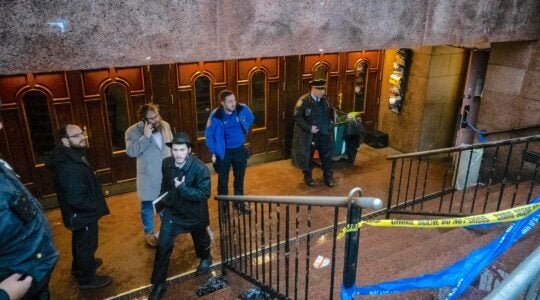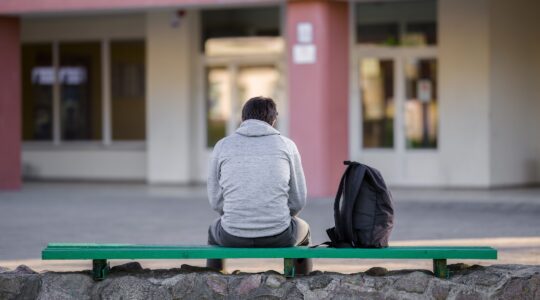From the White House on down, Americans have been scolded not to draw any negative conclusions about Islam just because of the coincidence that so many terrorists happen to be you-know-what. But is there a problem when religion itself is blamed for terrorism?
A few weeks ago on ABCís UpClose (Dec. 26), Nightlineís sister program, host Chris Bury described guest Rabbi Brad Hirschfield, vice president of CLAL, the National Jewish Center for Learning and Leadership, as someone ìwho is deeply concerned about the evil that often lurks within religion.î Not sometimes lurks but often lurks.
We are told by UpClose correspondent Michelle Martin that Rabbi Hirschfield left the United States to become a settler in Hebron, whereupon he saw ìmassive injusticeî perpetrated by Jews. Then he moved back to America.
ìAnd after Sept. 11,î Martin said, ìhe came to the conclusion that the Muslims who hijacked those planes and the Jewish settlers on the West Bank share one thing: the desire to be 100 percent right.î
Of course, Churchill and Hitler shared a desire to be 100 percent right, but what weíre clearly meant to see is that Jews have as much right to be on the West Bank as the hijackers had a right to be on the 85th floor, with the same demonic results.
Rabbi Hirschfield told ABC that when he saw the World Trade Center burning, he knew that ìreligion drove them into the building. Ö My guess is that there are people that could tell a similar story about the abuses done over time by Jews.î And, of course, ìChristians.î
Appearing a few nights later on Zev Brennerís Talkline radio show on WMCA (Dec. 28), Rabbi Hirschfield gave the example of Yigal Amir, the Orthodox assassin of Yitzchak Rabin, as proof of someone who used religious justification for murder. Brenner pointed out that Amir and his rationale were condemned vehemently with near unanimity by Orthodox rabbis, ìbut in the case of Arab terror, they are not ostracized by members of their religion, they are glorified. That is a very big difference.î
Rabbi Hirschfield said sadly that the Jewish commitment to Hebron ìhas proven toxic.î He said Jews have ìa rightî to Hebron, but is it worth fighting for? He pointed out that ìuntil the 1967 war, the Jewish people never thought to go to war to take back the Kotel [the Western Wall], even though clearly the Kotel is ours [and] the holiness of Hebron goes back a lot farther than the does holiness of Jerusalem.î
Brenner, who is Orthodox, did a far better job than UpClose at bringing out Rabbi Hirschfieldís Jewish soul. Rabbi Hirschfield told Brenner that when Jews say ìWhy would you want Hebron, who cares,í thatís heartbreaking to me. Because as much as I believe we wonít be able to stay, I will weep when we have to leave.î
The Jewish Week called Rabbi Hirschfield to further clarify his ideas. Yes, he said, religion can be dangerous when misused, but when it comes to settlers and terrorists, ìby no means is the magnitude of the danger equivalent.î The misuse of religion, said the rabbi, is something he has to explore as a theologian, but when it comes to the threat posed by Jews or Muslims, ìI wouldnít make the comparison.î
The rabbi said, ìWe have people who call what [the Israel army] does to [Palestinians] murder, and thatís just not true, but we have people who say because itís not murder it doesnít count, and thatís not true either. When a Palestinian mother loses her son, even if her son was a murderer, she cries. And my humanity is lost if I forget that.
ìBut it doesnít mean I shrink from calling the SOB a murderer. And I regret we couldnít kill him before he did his murder. But that doesnít mean that afterwards we canít recognize our enemies as human beings.î
ìIn Jenin,î said Rabbi Hirschfield, ìbrave Israeli commanders said weíre not going to lose our hearts and souls while fighting for our lives. But I try to imagine, if Iím the parent of an Israeli soldier who was killed in Jenin ó because we went in carefully and didnít just bomb the daylights out of the city ó if Iím one of those parents, Iím not so sure Iíd make that deal. In fact, Iím sure I wouldnít. You can have my soul, just give me back my dead son. We have to struggle with that.î
Jews have the right to live on the land, ìbut the fact that we have the right to do so doesnít make it the right thing to do,î said Rabbi Hirschfield, ìnot at the price that subduing the Palestinians will extract from Jewish lives, from the Jewish soul, from the idea of a Jewish democracy.î
Surrender is the wrong word to use for withdrawal, he said. The right word is tzimtzum, the kabbalistic idea of Godís withdrawal and contraction to make space for creation and humanity.
ìWhen withdrawal is done out of weakness it leaves death in its wake,î the rabbi said. ìWhen itís done for holiness, it brings life. The question is not are we strong or are we weak. It is do we leave death in the wake, or life? The question of war is not yes or no, but how and why.î
The problem is that our messianic dream for the land, said Rabbi Hirschfield, cannot survive without messianic guidelines and messianic behavior.
Everyone now sees the inevitable West Bank surrender. Israelís spirit has been damaged, said Ruth Matar on the Women in Green radio program (Jan. 8) on Arutz Sheva radio. A few years ago, ìwhen we learned that even just one of our innocent Jewish brethren was killed, we would quickly telephone each other and arrange a demonstration.î Today, ìwe have become resigned to hearing, on an almost daily basis, that fellow Israelis have been murdered,î she said.
Matar asked, ìWhat has happened to us? Why was the loss of an Israeli life so inconceivable before and so acceptable now? It is as if we have become resigned that there is no solution to the constant killing of our people.î
She couldnít help but note that in the coming elections, both of the main candidates see withdrawal and a Palestinian state at the end of the road.
ìLetís face it,î said Matar, ìthe survival of Israel as a viable Jewish state is in grave danger.î
Yes, it is, said Haaretz (Dec. 31): ìIsraelís public has paid a stiff price for the dangerous adventure of establishing Jewish settlements around Palestinian population concentrations in the territories. The time has come … to demand that settlers return Israelís borders within the Green Line.î
Yediot Achronot (Jan. 1) said itís time to stop ìthe waste of huge sums in return for marginal improvements in the security of Jews, most of whom do not need to be in the places where they have chosen to live.î n
The New York Jewish Week brings you the stories behind the headlines, keeping you connected to Jewish life in New York. Help sustain the reporting you trust by donating today.




